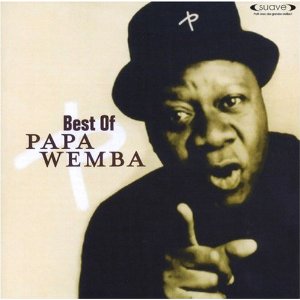this is Darlene. I find myself wishing I had a camera or even a voice recorder pretty often here in Kinshasa. It tells you that, despite its drawbacks, it's quite a fascinating place.
Even though I know I only caught a bit of what T was saying, and he had to use the international sign language of "boom, boom, boom" and punching his fist into his hand to help me understand, it feels good to have conversations in which I'm able, somehow, to participate and understand a bit more about this place I've spent several weeks this year. These things that I'm learning don't make the news.
One way I'm learning about Kinshasa is through my driver, who picks me up and drops me off from the hotel each day. "T" doesn't really speak much English (although a bit more than my French). So sometimes we sit quietly. At other times, T plays music for us on his 1990s-style walkman tape deck. His tapes are pretty worn out from overuse, so the music can get a little warbly, but it's actually nice to hear classical tunes and sometimes African music to counter the noisy, pothole-filled roads and the loud crowds in traffic-filled areas. It's soothing.
That said, I decided when I arrived this time that I was going to do my best to immerse myself a bit more in French language so that I could pick up more vocabulary and improve my speaking ability. T is the perfect person to practice with, because I have to get creative in order to communicate. Saying the English word may or may not work. I call T "ma professor Francais." (note, I'm not going to try to do any of the crazy accents and c-squiggles on this post. My grammar is atrocious. If you are an actual French speaker and are offended, get over it. Just kidding! :) A lot of times, I sit there saying..."je...je..." trying to come up with the verb/word I'm looking for, or something that will approximate it. Other times, I use opposites--vocabulary I have learned to figure out a different word I don't. T is a patient teacher.
This morning's "lesson"/conversation started with a discussion of how the government blocks the roads near the president's house. Avec plates diplomatique, la voiture peut entrer, (but) une voiture normale ne entre pas. (Roughly, with diplomatic plates, the car can enter, but a normal car can't enter). And definitely not this car below).
We then started talking about the street vendors and others being evicted forcefully by police in recent days. I asked him, in broken French, about those people with disabilities who were protesting several days ago after police very forcefully pushed them out of an area close to the port. I missed a lot of what T said during this point, because he was talking faster and with vocab words I hadn't learned yet. But I could tell this--he was saying, all the police needed to do was come in, and calmly, calmly say "stay calm, stay calm. You need to move out of this area--you can go to this other area." Instead, the police came with a strong hand--tres fort--and "boom, boom, boom." (This I understood unfortunately all too well, as I heard that several people in wheelchairs were severely beaten by police a few days ago near the port). He said that, along with the physically disabled, there are mentally disabled and disturbed (derange) people in the same area. So, when the police comes down--"boom, boom, boom"--they respond the same -- "boom, boom, boom." The situation just gets worse. Sadly for some individuals, the government's heavy handedness is a fact and way of life.
Even though I know I only caught a bit of what T was saying, and he had to use the international sign language of "boom, boom, boom" and punching his fist into his hand to help me understand, it feels good to have conversations in which I'm able, somehow, to participate and understand a bit more about this place I've spent several weeks this year. These things that I'm learning don't make the news.
While learning a new language itself is really interesting and fun, it's also so much more humanizing for my interactions with people here. I am thankful for the few words I'm able to speak to thank people, to hear about T's children, to ask about how someone's evening was. I hope to learn more in the few days I have remaining--a different attitude than when I arrived, thankfully.


































